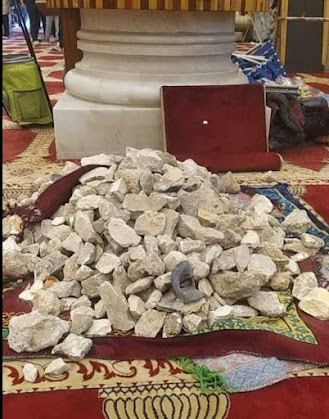By Daled Amos
I remember the Iran hostage crisis during the Carter administration, when the
US was humiliated by its inability to rescue the Americans being held by Iran.
One of the points made at the time was that Iran would never have tried
something like that with the USSR -- for fear of the ruthless reaction that
would result. Yet just a few years later, the USSR found itself mired in a
10-year war in Afghanistan, a war that it lost.
At the time, the UN General Assembly passed a resolution condemning the Soviet
presence in Afghanistan, while aid -- both economic and military -- was
provided to the Afghan rebels, and sanctions were imposed.
In the end, not only did the Soviet Union find itself forced to leave
Afghanistan, the failed war is counted as one of the reasons for the fall of
the Soviet Union.
So much for the ruthless image of the USSR -- and Russia.
Yet Russia bounced back, especially in the Middle East, where Putin has been
able to establish a solid foothold in the area, especially as a factor in
Syria and as a partner with Iran. Israel's ability to strike at Iranian
targets in Syria and prevent Iranian supplies going to Hezbollah is dependent
on maintaining good relations with Russia. Clearly, Russia is again a force to
be reckoned with and respected.
And now comes the Russian invasion of Ukraine. Are Russia's unexpected
difficulties in Ukraine a new sign of weakness?
That is what Ehud Yaari, an Israel journalist, is claiming. Yaari writes
that Russia's apparent weakness is not going unnoticed in the Middle East. According to Yaari, this goes beyond the performance of the Russian troops
themselves and extends to the performance of the Russian weapon systems --
Although many of the Arab states were reluctant to openly denounce the
invasion of Ukraine, everyone in the region I spoke with has second thoughts
about Russia. Russian prestige suffered an enormous blow in the region and I
don’t think it will be very easy for them to regain their previous prestige. I
doubt it’s going to happen.
Putin may have thought that Russia's success in Syria was good preparation for
invading Ukraine.
Putin was wrong.
And as much as he may have considered Ukraine to be an opportunity to showcase
Russia's military might and technology to both the West and to Russia's
clients, it has been anything but.
So far, it's like Afghanistan all over again.
Not only in terms of military failure, but also in terms of the West's
reaction in helping Ukraine and imposing sanctions.
And while the Arabs are not coming out openly in support of the West, neither
are they in any hurry to come out publicly in support of Putin.
And what about Iran?
Yaari writes:
The internal debate in Tehran is also very interesting. Because you see a very
clear divide between the radicals, the hardliners, supporting Russia and what
is called sometimes the "reformists" expressing criticism of Russia. I believe
doubts in Iran and in the Arab world are going to grow as to what extent they
should rely on Russia.
It can't be good for Russia to appear weak in the eyes of Iran.
Going a step further, Yaari believes that Russia's troubles actually make the
US look good -- despite Biden's own disastrous retreat from Afghanistan just
last year. At the time, the impression was that the US withdrawal showed that
the US did not have the stomach for what was required to defend its interests
abroad and to defend allies that it had promised to defend.
But now the US may be redeeming itself, as it helps Ukraine and plays a major
role in uniting Europe against Russia and imposing various sanctions.
Bottom line, Yaari sees the potential for a new balance of power in the Middle
East, one that will include Turkey and will mobilize against Iran:
I believe that the more we will see understandings between Turkey and the US,
between Turkey and the local players – the Arabs and Israel- we will see
closer cooperation between the Arab Sunni states, Turkey, Israel to try to
block Iranian advances.’’
There are tectonic global shifts afoot, and Russia’s invasion of Ukraine may
be the start of new global chaos, in which countries such as Israel need
closer regional partnerships. That is why Israel’s Minister of Foreign
Affairs Yair Lapid departed for a diplomatic visit to Athens on April
5...
In short, Israel is not just building an alliance of the
willing with Arab states but also mapping out a new system of states that
links Greece with Egypt and onward to the Gulf and India. This will be knit
together with Israeli technical know-how and the shared concerns these
states have about bellicose neighbors or a world in which countries such as
Russia can upset the apple cart of international relations.

|
|
Foreign Ministers at the Negev Summit
|
When the USSR lost its foothold in Egypt, there was an opening for the
Begin-Sadat peace initiative. A weakening of Russia's position in the Middle
East today again creates possibilities.
Where does all this leave Putin's Russia?
Back in 2011, Lt. Colonel James G. Zumalt warned that
by working closely with Iran, Putin was putting Russia in danger:
What Putin fails yet to grasp is the major Islamist threat looming ahead for
Russia. Based on low birth rates for native Russians and much higher ones
for Muslims, it is estimated by 2050 the country will boast more Muslims
than native Russians. This evolution, combined with Putin’s policies towards
Iran, will leave Russians facing a very serious threat.
As Zumwalt sees it, Russia's support of Iran's quest for nuclear weapons
will come back to haunt it.
Putin naively believes in a non-existent Russian/Iranian bond that places
Moscow outside Iran’s crosshairs. But Iran eventually has in mind for Russia
the same fate it has for other non-Islamic states—a fate shared by the
Caucasus Emirate: i.e., to make the country subservient to shariah law.
Zumwalt supports his contention by quoting from a letter Ayatollah Khomeini
sent to Gorbachev back in 1989, as the Soviet Union was beginning to
dissolve. In the letter, the Ayatollah suggested replacing Marxism in Russia
with Islamism:
I strongly urge that in breaking down the walls of Marxist fantasies you do
not fall into the prison of the West and the Great Satan. I openly announce
that the Islamic Republic of Iran, as the greatest and most powerful base of
the Islamic world, can easily help fill up the ideological vacuum of your
system.
Today, Russia is still a major force in the Middle East.
But it may soon
find that the Middle East is as inhospitable as Ukraine.
And that might not be such a bad thing.
|
 Buy the EoZ book, PROTOCOLS: Exposing Modern Antisemitism today at Amazon! Buy the EoZ book, PROTOCOLS: Exposing Modern Antisemitism today at Amazon!
Or order from your favorite bookseller, using ISBN 9798985708424.
Read all about it here!
|

|


 Elder of Ziyon
Elder of Ziyon





































